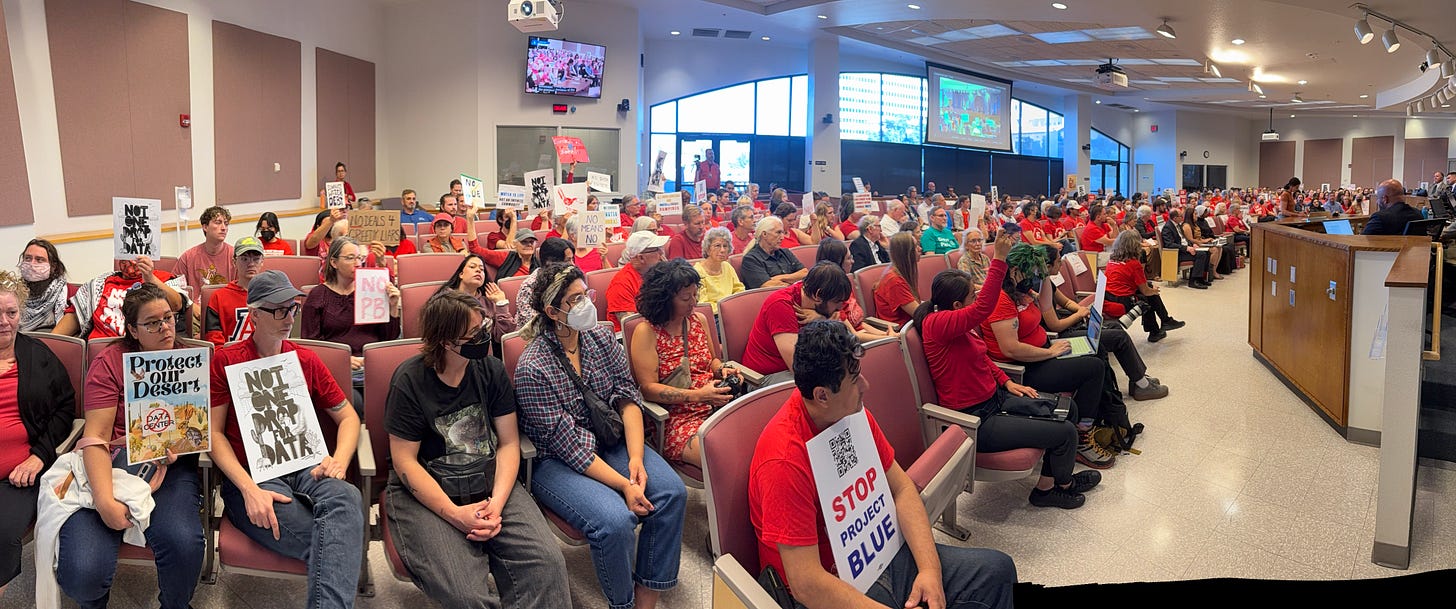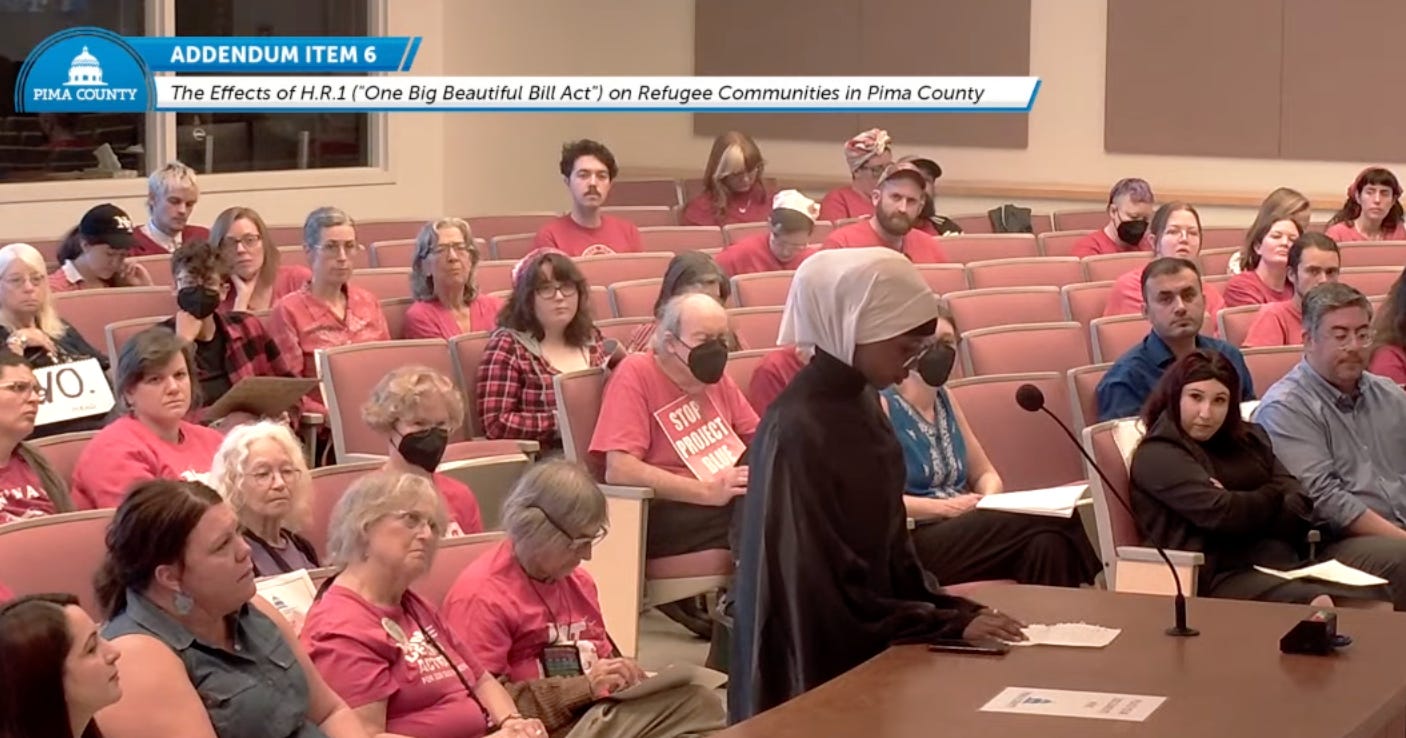Project Blue takeover edition
Is it too late to say no? … Crashing the Party (fundraiser) … And welcome, cartoonists!
The biggest issue at Tuesday’s Pima Board of Supervisors meeting wasn’t on the agenda.
In fact, the supervisors might not formally discuss the item that brought in hundreds of people — so many that security had to turn away about 100 protesters — for months, if at all.
Dressed in red shirts and holding colorful signs, hundreds of No Desert Data Center Coalition members showed up to the morning meeting, pushing Supervisors Matt Heinz and Rex Scott to break their contract with the developers of Project Blue.
The sales purchase agreement was approved by the supervisors back in June, and locals want the board to break the contract before the $20.9 million sale of 290 acres of county-owned land is finalized, probably by the end of the year. The data center developers want to break ground in 2026.
So why target Heinz and Scott?
The No Desert Data Center Coalition already has the support of supervisors Jennifer Allen and Andrés Cano. But to get a majority, they’ll have to flip one more vote.
Heinz is the obvious target: He briefly wanted to bring the contract back for a discussion after learning Tucson Electric Power was asking for a 14% rate increase.
Scott and Republican Supervisor Steve Christy appear less likely to change their stance on Project Blue.
Allen and Cano have been open about fearing a legal fight with the proxies for Project Blue, saying they’d rather go to court than live with the long-term environmental impacts tied to the massive development.
If Heinz and Scott don’t reverse their positions, they may face a political fight.
The No Desert Data Center Coalition has discussed a recall effort targeting the two Democrats, but is focused on lobbying the two men to change their positions first.
Recalling either supervisor would be a heavy lift, requiring tens of thousands of signatures from residents in their districts.
Another big, beautiful headache
Members of the International Rescue Committee in Arizona and Lutheran Social Services of the Southwest spoke about how the reduction of Supplemental Nutrition Assistance Program Arizona (SNAP) benefits tied to the Big, Beautiful Bill will impact the local refugee program.
The concern is that the cuts to SNAP tied to the federal legislation will hit refugees living legally in Southern Arizona particularly hard.
To be clear, refugees with legal protected status are eligible in Arizona for some benefits, including SNAP.
The board listened to the discussion, but didn’t take any formal action on Tuesday.
Inaction by the supervisors on Tuesday shouldn’t be considered indifference, but a signal of how tight the county’s budget is right now.
Pima County has just under $900,000 in its contingency fund, one of the sources county officials could use to offset SNAP payments.
Other business
Here are a few other highlights from Tuesday’s meeting.
The supervisors signed off on a $2.2 million request to increase the jail’s contract to serve food to inmates, raising costs from $1.7 million to $3.9 million. The costs are associated with a higher inmate population, the transition from packaged meals to meals prepared in the jail kitchen after renovations and a 6% increase in food costs.
The supervisors voted 4-to-1 to renew their opposition to the proposed Copper World Project, with Christy voting against the measure. The vote essentially reaffirms previous votes by the board (with different members) opposing the planned open-pit copper mine in the Santa Rita Mountains about 28 miles southeast of Tucson.
We don’t have an update on the outside counsel that the Pima County Attorney’s Office wanted to hire related to the Pima County Sheriff’s Department. After Tuesday’s executive session, the board simply voted to proceed as discussed in the executive session. But given the board’s previous actions to refer investigations by the Arizona Attorney General’s Office, as well as an ongoing investigation by county administration of the “buddy punching” allegations at PCSD, it seems likely this will appear on a future agenda.
By the time the supervisors’ meeting rolled around, Project Blue protesters had already started making their point.
A quiet fundraiser at a local wine bar on Monday night was supposed to benefit the Pima County Democratic Party.
Instead, protesters outside — and at least one who bought a ticket — crashed the event hosted by Pima County Supervisor Matt Heinz over concerns about Project Blue.
Heinz, who owns Tinajas Wine and Beer on the northeast side, was raising funds for the county party. Generally speaking, those funds are used for day-to-day operations and are important to stockpile ahead of the 2026 election.
The No Desert Data Center Coalition protested the fundraiser to get Heinz’s attention, pushing the two-term Democrat to change his stance on Project Blue. The group specifically wants Heinz to stop the land sale to the developers behind the data centers.
“There’s still time for Matt Heinz to listen to his constituents and reverse course on Project Blue,” the No Desert Data Center Coalition said in a statement.
Heinz welcomed the criticism on Monday night, saying their questions started the question-and-answer part of the fundraiser a little earlier than planned.
Despite the outburst, Heinz invited protesters to stay for the fundraiser.
She did swear (to sue): Adelita Grijalva joined Attorney General Kris Mayes in a lawsuit against the U.S. House yesterday that the duo filed over Speaker Mike Johnson’s refusal to swear in the newly elected congresswoman. They want the court to force Johnson to swear in Grijalva or let her be sworn in by someone else.
“The 813,000 people who live in her district are right now being taxed without representation,” Mayes told reporters yesterday. “We fought a revolutionary war over that issue, and it’s not acceptable for any speaker of the House to deprive the state of Arizona of one of our representatives.”
ICEd out: The Maricopa County Sheriff’s Office’s ongoing federal oversight from a 2009 racial profiling case has become a cautionary tale for other state policing agencies who are hesitant to participate in ICE’s 287(g) task force program, Rafael Carranza reports for the Arizona Luminaria and ProPublica. Nine Arizona law enforcement groups currently have an agreement to work with ICE when they make arrests, including the Pinal County Attorney’s Office. Speaking of Pinal County, former Sheriff Mark Lamb filed a statement of interest to replace U.S. Rep. Andy Biggs in CD5, per the Arizona Mirror’s Jerod MacDonald-Evoy.
Benched by bureaucracy: Visa issues forced the Tucson Baseball Team to cancel its second series of the season, the Tucson Sentinel reports. The team recently relocated from Navojoa, Sonora, Mexico, and the U.S. consulate in Hermosillo told the team its visas were invalid.
No, with footnotes: UA President Suresh Garimella’s letter declining the Trump compact reads more like a negotiation than an outright denial, the Star’s Tim Steller writes. Other university leaders’ denials of a deal that would link federal funding to political compliance are much clearer in their opposition, while Garimella argues for a strictly merit-based funding system.
Authoritarian funding compacts? We’re a hard no. Subscribe for the straight answers.
Lights out: Residents in Tucson’s southside say their streetlights have been out for almost two years, but the city hasn’t done anything after several 311 complaints, KGUN9’s Jacqueline Aguilar reports. Tucson officials said they’re working on it, but crews found a short in the wiring, and 17 of the lights are out because of copper wire theft.
Occasionally, we have readers who reach out offering story tips, feedback and photos.
We held this reader-submitted artwork for a few days, waiting for University of Arizona President Suresh Garimella to make a decision.
Garimella didn’t sign the compact, so their illustration lost some of its editorial heft. (Check out today’s Education Agenda for more details on Garimella’s decision)
But it’s still a good laugh, even if he doesn’t get the lightweight champion belt.










I worked with KR Sridhar when he was at the UA who is now the founder and CEO of Bloom Energy who signed a huge contract with Oracle to provide their AI Centers with power. He invented with NASA funding a method to extract oxygen from the atmosphere and use it to power AI centers. No 14% increase in TEP rates. The question is then water use to cool these AI centers. There are potential ways to cool AI centers with immersion cooling which submerge servers in non-water coolants such as synthetic hydrocarbons and microfluidics that bring the artificial coolants directly into the computer chips through micro channels and are much more efficient because they are directly connected to the heat source!
That's a shame about the Tucson Baseball team. Many people are unaware but Fernando Valenzuela y la familia are from Navajoa. Also one other Major Leaguer I can't remember.